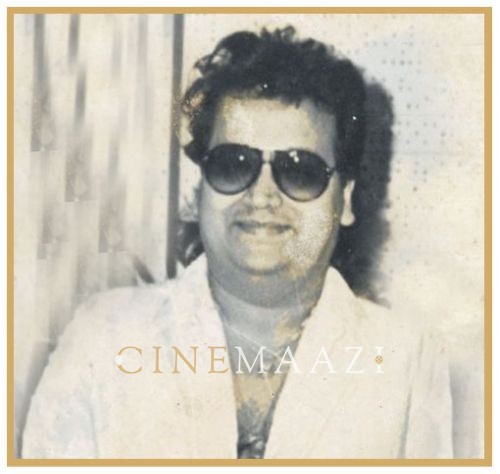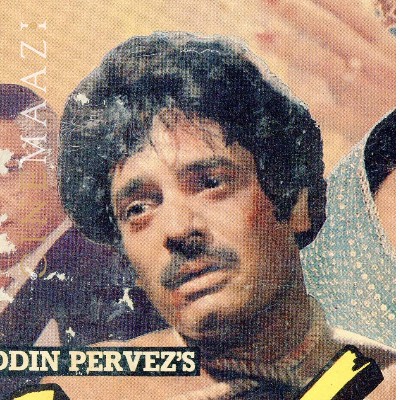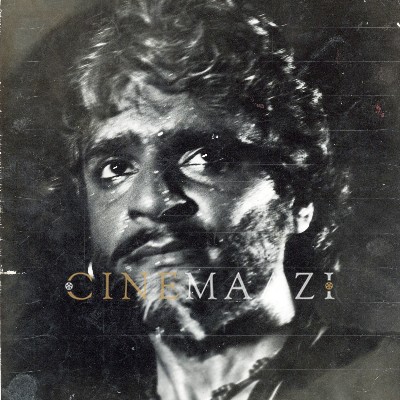Bappi Lahiri

Subscribe to read full article
This section is for paid subscribers only. Our subscription is only $37/- for one full year.
You get unlimited access to all paid section and features on the website with this subscription.
Not ready for a full subscription?
You can access this article for $2 , and have it saved to your account for one year.
- Real Name: Alokesh Lahiri
- Born: 27 November, 1952 (Jalpaiguri, West Bengal, India)
- Died: 15 February, 2022 (Mumbai, Maharashtra, India)
- Primary Cinema: Hindi
- Parents: Aparesh and Bansari Lahiri
- Spouse: Chitrani Lahiri
- Children: Bappa Lahiri, Rema Lahiri
Known as India’s ‘Disco King’, Bappi Lahiri is a singer, composer, and record producer known for his music in films such as Disco Dancer (1982), Namak Halaal (1982), Dance Dance (1987), Saaheb (1985), Sailaab (1990), and Sharaabi (1984). He also scored music for Bengali films such as Amar Sangi (1986), Asha O Bhalobasha (1989), and Raktelekha (1997). Popularising the usage of synthesised disco music in film songs, he has also rendered some of his compositions such as Yaad aa raha hai, Yaar bina chain kahan re, Tamma tamma loge, Ooh la la, and Tune maari entriyaan, among others. Known largely for his disco-style songs, he also composed melodious numbers in films like Chalte Chalte (1976) and Zakhmi (1975). In the course of his approximately 45-year-long career, he has rendered playback for generations of actors, like Dev Anand, Sunil Dutt and his son Sanjay Dutt, Amitabh Bachchan and his son Abhishek Bachchan, Dharmendra and Sunny Deol, as well as the current crop of stars such as Ranveer Singh and Varun Dhawan. An iconic figure in the industry, who desired to emulate the look of his childhood hero Elvis Presley, he is also a showman with his copious gold chains, and unflappable confidence.
Born as Alokesh Lahiri on 27 November, 1952, he hailed from a musical background; his father, Aparesh Lahiri being a popular Bengali singer and his mother, Bansari Lahiri, a musician and singer well-versed in classical music and Shyama Sangeet. His mother was close to the family of Kishore Kumar, who was his maternal uncle. Lata Mangeshkar, who was a friend of the family, suggested that his parents send him to train under prominent tabla exponent, Pandit Samta Prasadji. Trained early in music, he was just 4 when he made his debut in public as Master Bappi, playing the tabla at a concert at Calcutta’s Eden Gardens. Ever since he could remember, he wished to be a musician. He began composing his own songs at the age of 11, performing alongside his parents. He was still in his teens when he composed the music for a Bengali film, Dadu (1969). With his heart set on working in the Hindi film industry, he ran away to Bombay. His parents followed, in order to help him establish himself in the city. His uncle Kishore Kumar proved to be helpful—when his nephew Shomu Mukherjee needed a composer for Nanha Shikari (1973), he heard of Lahiri’s work and signed him on. The music of the film was well-received; however, bigger things were in store. Filmmaker Tahir Hussain had heard Lahiri’s Ek ladki badnam si, and was impressed. Hussain offered him his next film Zakhmi (1975), which was to prove a suitable pad for Lahri to make his mark as a much sought after and successful music composer in the Hindi film industry. Each of the numbers, including, Jalta hai jiya mera bheegi bheegi raaton mein (rendered by Kishore Kumar and Asha Bhosle), Zakhmee dilon ka badla chukane (sung by Kishore Kumar) and Aao tumhne chand pe le jaaein, were a hit. With his compositions, he also showed his command over his technique as each song was of a different genre. The influence of R D Burman could be gauged in the composition style of the song Nothing is impossible.
At the beginning of his career, the music he scored for films like Chalte Chalte (1976), Paapi (1977) and Aap Ki Khatir (1977), were in the manner of composers of that era. This possibly showed his desire to be taken seriously. While he had always been interested in Western music, in the 70s he had yet to move in that direction. Aware of the influence of R D Burman, who ruled the realm of music in the 70s, he also realised that if he was to win favour and make his mark, he would need to offer Hindi films a new sound. Inspiration came when he walked into a Chicago nightclub in 1979, while on a tour of USA with his uncle Kishore Kumar. When the disc jockey at the club played the disco number Saturday Night Fever, it was love at first sound for Lahiri. He heard the pumping beat, and immediately decided that he was going to bring it to India. Procuring a Moog synthesizer, and futuristic-sounding sequences, he prepared to create interludes and tracks that would bring the global disco sound to Hindi film songs. He bided his time and waited for the right opportunity. It came when he received a call from filmmaker Ravikant Nagaich, who was gushing about a new actor, whom he described as John Travolta meets Bruce Lee; a combination of dance and action. Offered the chance to create a beat for him for an upcoming B Subhash film Disco Dancer (1982), Lahiri composed the song I am a disco dancer. The songs and the film were an overnight success, with the soundtrack establishing leading man Mithun Chakraborty’s status as a star for the masses and Bappi Lahiri as India’s disco king.
With the disco trend having well and truly arrived In India, Lahiri went on to compose a host of disco inspired numbers such as Dance dance, Hari om hari, Rambha ho, Yaar bina, De de pyaar de, and Jawani janeman. His sense of rhythm was excellent; however, critics opined he went overboard with disco, imitating original international albums. He has faced criticism for copying Western hits, such as Raindrops keep fallin’ on my head in Dur dur tum rahe, Elvis Presley’s Wooden heart in Kitne phool, Mory Kanté Tama tama in Tamma tamma, Buggles’ Video killed the radio star in Koi yahaan naache, and Jimmy Jimmy from Ottawan’s T’es OK, T’es Bath. However, he has not shied away from admitting to it, adding that he lifted the entire style of the song. What’s more, he points out that most music directors did the same, with R D Burman’s Aao twist karein taken from Chubby Checker’s Let’s twist again, and Mehbooba mehbooba from the Cypriot folk song Ta rialia. Lahiri also maintains that his classical chapter has been largely ignored. He did compose songs with a classical base such as Dard ki raagini (Pyaas, 1982) in raag Abhogi Kanada, Kisi nazar ko tera intezaar (Aitbaar, 1985) in raag Bhairavi, and Ke pag ghunghroo bandh (Namak Halal, 1982) in raag Darbari. The latter also had elements of qawwali, and disco.
While he ruled the 80s with his disco-dance hits, the 90s were a comparatively low period for Lahiri with the arrival of music directors such as Nadeem-Shravan, Anand-Milind, and Jatin-Lalit, who offered melodies over pulsing beats. There was also A R Rahman, who created a sound combining Western classical music with southern sensibilities. To Lahiri’s credit, he managed to endure and sustain. Popular for his live shows across the world, some of his songs have also gone international. His Come closer (Kasam Paida Karne Wale Ki, 1984) featured in the Oscar-nominated Lion (2016), Jimmy Jimmy was used in Adam Sandler’s You Don’t Mess With the Zohan (2008), and Yeh raat hai jo mazaa hai featured in Guardians of the Galaxy Vol 2 (2017).
Incidentally, he also dubbed for the Hindi version of Kingsman 2 (2017), for Elton John’s character, as well as for Moana (2016) for which he dubbed lines as well as recorded a song for Tamatoa, the gold-wearing crab.
Lahiri has also enjoyed success as a playback singer with music directors Vishal-Shekhar, who first collaborated with him for Mumbai nagariya (Taxi No 9211, 2006). Admirers of the ‘camp-ness’ that he brings to a tune, the music director duo believe that his delivery and expression give him a unique flavour that cannot be duplicated. In 2011, Vishal-Shekhar also reworked one of Lahiri’s Jeetendra hits, Ui amma (Mawaali, 1983) into Ooh la la for Milan Luthria’s The Dirty Picture (2011). Their third collaboration with him also became a hit; namely Tune maari entriya (Gunday, 2014). Lahiri joined BJP in 2014. He lost the election as the BJP candidate from Srerampur (Lok Sabha constituency) in West Bengal for the 2014 Indian general election.
Bappi Lahiri remains recognised as the sole originator and pioneer of the disco beat in India.
-
Filmography (2)
SortRole
-

Kalaakaar 1983
-

Badhti Ka Naam Dadhi 1974
-









.jpg)



